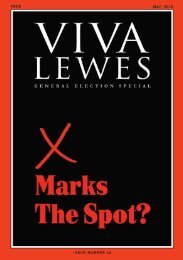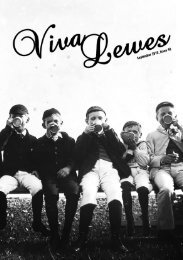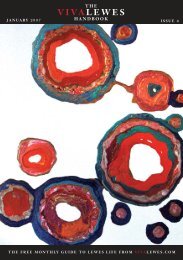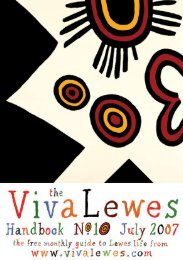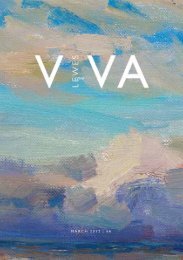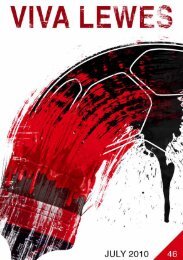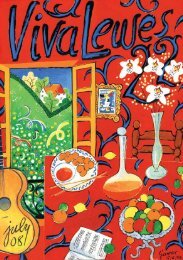Create successful ePaper yourself
Turn your PDF publications into a flip-book with our unique Google optimized e-Paper software.
Jeremy oveNdeN<br />
A <strong>Lewes</strong>-based Italophile<br />
Young <strong>Lewes</strong>-based tenor Jeremy Ovenden has<br />
established himself as one of the premier Mozart<br />
singers of his generation. His new CD, Mozart: An<br />
Italian Journey is out now on Signum Records (to be<br />
reviewed next month).<br />
Jeremy, with your new CD you’ve created a really<br />
interesting homage. What’s this journey about?<br />
My mission was to have the listener discover how<br />
the young Mozart developed as a composer. I have<br />
to admit I wasn’t sure what to expect – he wrote<br />
Sposa Cara when he was only 12 years old! But these<br />
obscure arias are real gems and I’m thrilled to have<br />
included them on the CD.<br />
Are there differences between Mozart’s early<br />
compositions for tenor and his later ones? The<br />
early tenor arias are definitely higher than the later<br />
compositions and also more florid. Also, the orchestration<br />
became more complex as he gained experience<br />
and perfected which instruments worked well<br />
with the tenor voice.<br />
I notice that the repertoire on the CD is only<br />
from Mozart’s Italian operas. I chose Italian<br />
repertoire because of my affection for the country<br />
where I lived for 5 years and where my career took<br />
off. I am also fluent in Italian, which puts me at ease<br />
with the language and allows me to colour the words<br />
appropriately. I still sing a lot in Italy and enjoy going<br />
back but <strong>Lewes</strong> is now home. We fell in love with it<br />
in 2006 when my wife (singer Miah Persson) and I<br />
were walking in Southover Grange and saw a young<br />
guy playing the guitar to his girlfriend under a tree.<br />
We both said, “This is the place to live.”<br />
I see from your calendar that you’ll shortly be<br />
singing in Germany. Is it very different working<br />
there? Opera is in the blood in Italy. As a result the<br />
audiences are knowledgeable and expectations are<br />
extremely high. I remember singing at La Scala with<br />
Riccardo Muti conducting and looking up to the gallery<br />
where the famous loggianisti stand and thinking,<br />
W W W. V i Va L E W E s . C o M<br />
c l a s s i c a l m u s i c<br />
don’t muck up now. I didn’t, but you feel the pressure<br />
there more than in any other country. Singers are<br />
nervous before taking bows for fear of being booed.<br />
The UK is much more polite and in Germany they’re<br />
more critical about German repertoire.<br />
You studied voice with the great Nicolai Gedda.<br />
How did you benefit from that relationship?<br />
Gedda was and still is an inspiration. I always sang<br />
amazingly well in my lessons with him. I think just<br />
his presence and hearing his voice made me imagine<br />
I could sing anything. Recreating it at home was<br />
another matter altogether but it made me realise that<br />
without a solid technique there was no chance of<br />
being a singer.<br />
Advice for young singers? Remember the voice is a<br />
wind instrument. Singing is all about supporting the<br />
voice with the breath. Don’t overcomplicate; placing<br />
the voice and supporting the sound is what it’s all<br />
about. It’s taken me 20 years to work that out.<br />
And what’s on your iPod that you think would<br />
most surprise us? Mika. Love him. He’s a mixture<br />
of Freddie Mercury and George Michael. He was<br />
also classically trained at Music College and you can<br />
hear it. Paul Austin Kelly<br />
3 9



